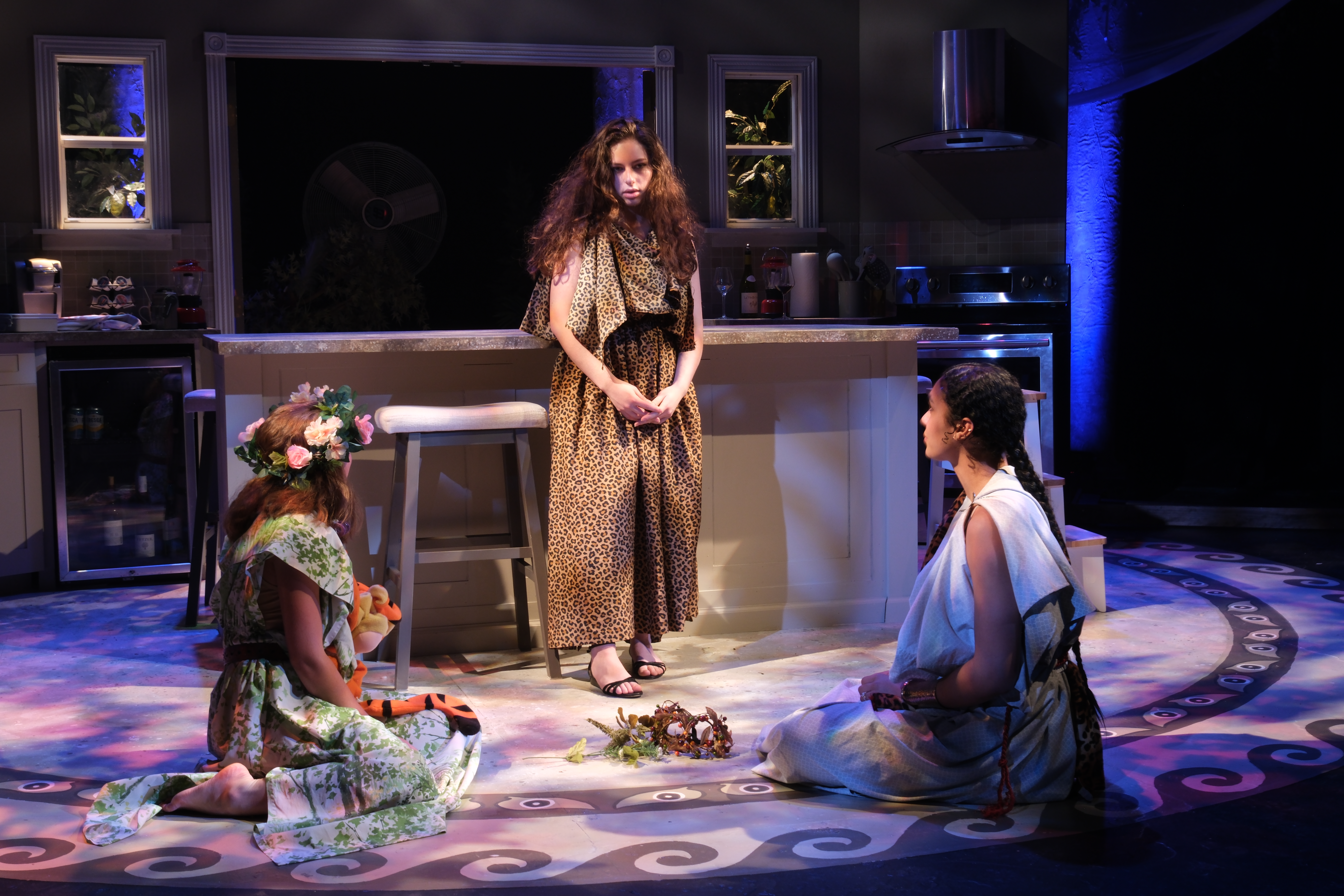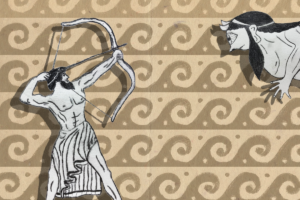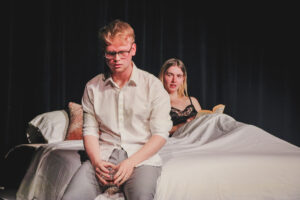To label Hurricane Diane “complex” would be a cataclysmic understatement.
A modern retelling of Euripides’s classical play The Bacchae with a queer, comedic, and environmentalist twist, Hurricane Diane—which will be coming to Georgetown from April 12-20—weaves a myriad of seemingly disparate strings together to create a mesmerizing, interdisciplinary tapestry.
In the play, eponymous protagonist Diane (Jane Cai, SFS ’24) is a butch lesbian gardener living in the upscale suburbs of New Jersey while concealing her divine identity: Dionysus, the Greek god of wine, festivity, vegetation, pleasure, and, fittingly, theater. Distraught by the uniform, manicured lawns pervading cul-de-sacs across the neighborhood—a physical representation of modern humanity’s impulse to domesticate—Diane is eager to bring about a new world order in which self-sustaining permacultures reign supreme. As to how she might achieve this lofty goal, there’s just one not-so-simple solution: she must convert four housewives—Pam (Amelia Scott, CAS ’26), Renee (Jazmyn Harmon, CAS ’24), Beth (Lucia McLaughlin, CAS ’25), and Carol (Claire Cable, CAS ’27)—into eco-acolytes through the art of seduction.
Winner of the Obie Award for Playwriting in 2019, Hurricane Diane is the idiosyncratic brainchild of Pulitzer Prize finalist Madeleine George. The show first premiered in 2017 at Two River Theater in Red Bank, New Jersey—the same town in which the play is set—after the theater commissioned George to write the show during the early days of her eight-year tenure as their playwright in residence.
In collaboration with Georgetown’s Theater and Performance Studies and Classics Departments and the LGBTQ Resource Center, Hurricane Diane is set to take audiences by storm at the Davis Performing Arts Center’s Devine Theatre this spring. Over the course of 90 minutes without intermission, theatergoers can experience an evening balancing hysterical bacchanalian hijinks with topical social commentary. Moreover, at 4 p.m. on April 12, the Devine Theater will also host Madeleine George for a Community Conversation on queerness and environmentalism.
Michael T. Williams, a Georgetown theater professor best known for teaching Performing LGBTQ+ Histories alongside LGBTQ Resource Center founder Sivagami “Shiva” Subbaraman, is Hurricane Diane’s passionate director. In an interview with the Voice, Williams said he found himself particularly drawn to the project due to the source material’s unconventional yet ingenious approach to discussions of the ongoing climate crisis.
“There is a lot of storytelling about climate change, but there isn’t a lot of comedy,” Williams said. “When you laugh, you open something different inside of you than when you’re feeling shamed by the awfulness of everything. Comedy opens a space for us to question our relationship to the environment in a meaningful way.”
As a classics major already familiar with The Bacchae, McLaughlin was initially enthusiastic about the show because of the ample connections between the script and her coursework. However, the play’s candid ecocentrism has similarly compelled her.
“The play incorporates themes of environmental sustainability by showing us we are focused on the wrong things,” McLaughlin said. “We live in a society built on prioritizing what’s most convenient, and this play breaks down all of that by focusing on what actually leaves us most fulfilled.”
One character fixated on these “wrong things” is Carol. When Diane divulges her impassioned permaculture pitch to Carol, talks of planting pawpaw trees give her pause. While Pam, Renee, and Beth are easily swayed by Diane’s call to the wild (as reflected in their wardrobes with Pam’s leopard prints, Renee’s breezy tunics, and Beth’s flowery dresses), Carol hesitates, fearful that succumbing to an unrestrained lawn will jeopardize her fragile heterosexuality. Despite Carol’s antagonistic resistance within the story’s structure, Cable embeds considerable sympathy into her character’s anxious demeanor.
Jessica Trementozzi handles the intricate, multidimensional set design with a similar care. The set is foregrounded by a pristine, upper-crust kitchen, but a peek through the sliding-glass door reveals a luscious, verdant paradise. Likewise, a semicircle of columns serves as the set’s backbone—a physical reflection of the play’s Athenian origins.
Hurricane Diane’s ecocentric subject matter inspired the cast and crew to conduct further research into the history of the land that the theater occupies. Assistant Director Ollie Henry (CAS ’24) led a land acknowledgment project for the Davis Performing Arts Center in conjunction with the show, resulting in a fruitful collaboration with Monnie, an Indigenous artist from a D.C.-based, Indigenous, Two-Spirit-led BIPOC theater group called the Angel Rose Artist Collective.
“Monnie has created a beautiful digital art piece that will be on permanent display in front of the entrance to the Devine Theater, a piece that solidifies the department’s commitment to investing in Indigenous art, impact, and wisdom,” Henry said.
Alongside a strong environmental emphasis, the show is also a celebration of the lesbian community, much to the delight of Cai, who plays the titular celestial Casanova herself.
“It is very beautiful to see a play which features so much queer love on stage, especially at a Jesuit university like Georgetown,” Cai said. “Georgetown is associated with a lot of liberalism today, but that liberalism still looks very white and straight in a lot of different ways. That’s what I’ve loved so much about Hurricane Diane—it’s a refreshing show with important messages at its center.”
With all five of Hurricane Diane’s roles written for women, the show is also strengthened by its tiny, tight-knit female cast.
“Entering a workspace that is predominantly women has been so great,” McLaughlin said. “You just get stuff done so efficiently and everyone is so comfortable. You just feel so relaxed and like you can talk about things openly, and I think that’s a really rare opportunity in theater.”
The cast’s comfort in rehearsals translates seamlessly onstage; their radiant chemistry lays fertile ground for comedy to sprout. Though Hurricane Diane is multifaceted, the show’s humor holds each of its moving parts firmly in place, ensuring nothing gets swept away in the storm. The result is a brilliant mosaic you’ll certainly want to see for yourself.
Hurricane Diane will take place April 12-20 at 8 p.m. in the Devine Studio Theatre. Tickets are available for purchase on Eventbrite or at the door. The cost is $3 for students and $10 for general admission.






